You might not have to decorate the space or provide the meals and transportation, but planning and running a virtual event is still hard work, especially when you’re dealing with a lot of software, people, and moving parts.
Event planners don’t want to invest all that time and effort for a low return. They want their virtual event filled with excited attendees who they can turn into repeat customers.
In this article, we’ll help you do just that by giving you five strategies—spanning the entire event registration process—that you can use to increase the number of registrations for your virtual events.
- 1. Offer Early-Bird Discount
- 2. Share Pre-event Content
- 3. Use Event Speakers to Your Advantage
- 4. Rely on Testimonials
- 5. Allow Post-event Access
- Conclusion
1. Offer Early-Bird Discount
Early-bird discounts incentivize people to buy tickets well ahead of time, typically a couple of months before the event, at a discount, which generally ranges from 10-25% off the normal ticket price.
They might also include other perks like VIP dining access or front row seating that make these attendees feel exclusive.
Below is an example from Creative Pro Week:
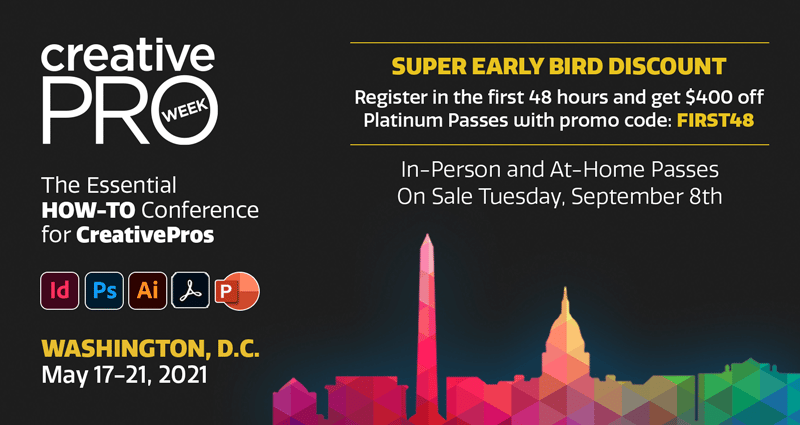
Source: CreativePro
Offering these discounts helps you increase your registrations by giving prospective buyers the feeling of urgency to register before the deal ends or, if you set a limit on the number of discounted tickets, before the tickets run out.
By using this promotion technique, you also capture a segment of your audience that wouldn’t have paid the price of a full ticket.
And, according to a research study, you might make your buyers feel good via an increase in their levels of oxytocin.
And if this happens, there’s a chance that the registrant will from now on associate your brand with good feelings, making them more likely to become repeat customers.
But the benefits of early-bird discounts don’t stop there. When people hold tickets to an event, they are also likely to talk about it with their friends, or even tell them to register.
That means your early-bird registrants act as your event’s unpaid marketers, sparking word-of-mouth referrals over the next couple of months, even after the early bird special has ended.
And that’ll boost your attendance.
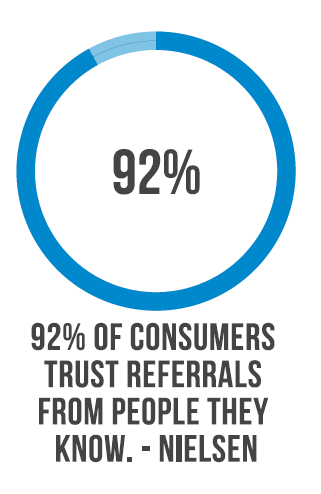
Source: RefferalRock
In order to get the word out about these amazing prices to your prospective buyers, it’s important to market these specials across various platforms, including your event website, email, and social media.
Many businesses will run an email drip campaign to people on their email list, especially past attendees.
They’ll also post about the early bird special on social networks where their target audience is most active.
In sum, if you want to increase registration to a virtual event, creating an early bird special and promoting it to ideal customers is an effective and affordable place to start.
2. Share Pre-event Content
Sharing the pre-event content is a great way to create buzz around a virtual event and draw more registrants to it.
That’s because the pre-event content can be used to educate your prospective attendees about the virtual event and its benefits.
They learn why they should attend, and whether it’s a good fit for them.
The proper education will contain the following key pieces of information concerning the event:
| Time of the event |
| Event schedule |
| Notable speakers |
| Main experiences and learnings |
| Testimonials from past attendees |
Additionally, you should also highlight the benefits of attending.
Share what your attendees will learn or receive at the event, whether that’s new ideas for running their business or an opportunity to network with powerful and interesting people in their field.
The Transformational CMO and Retail Virtual Assembly explain their event’s benefits nicely in the last paragraph of their event summary on their event registration page:

To take that a step further, you could also highlight three or four of the main benefits of the event and give prospective attendees the ability to learn more about each one, as Apartmentalize, albeit an in-person event, has done on their event page below:
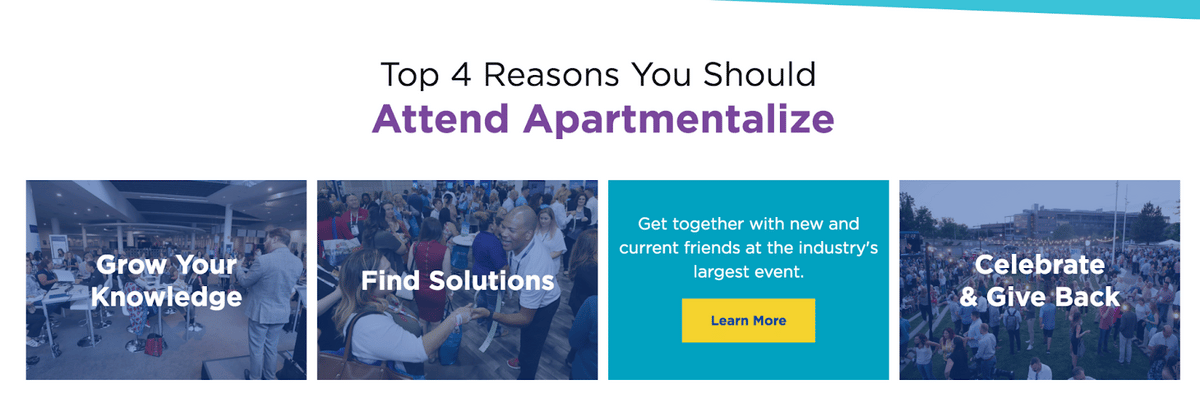
We also recommend using videos and images to show your potential customers what they can expect.
For example, on relevant social media networks and your event’s homepage, you could share videos of well-known speakers explaining what topics they’re going to cover at the event.
If you’re also hosting speakers who are a bit lesser known, you could even do short video interviews of them where you get them talking about their experience in the industry.
This will get people who were previously unfamiliar with them excited to hear them speak.
Lastly, try to anticipate questions and objections your attendees may have and include answers and rebuttals to them somewhere on your event page.
A good place for this is in an FAQ section. If it’s common enough though, put it front and center on your homepage.
For example, a lot of prospective attendees often wonder if the content they’ve seen at the event will be accessible after it’s over.
If you offer post-event access, which we recommend doing, then you should point this out in all event descriptions, perhaps in bold or colored lettering.
For inspiration, here’s an example of an FAQ section for DiversityX’s virtual job fair that answers some important questions for those considering attending:
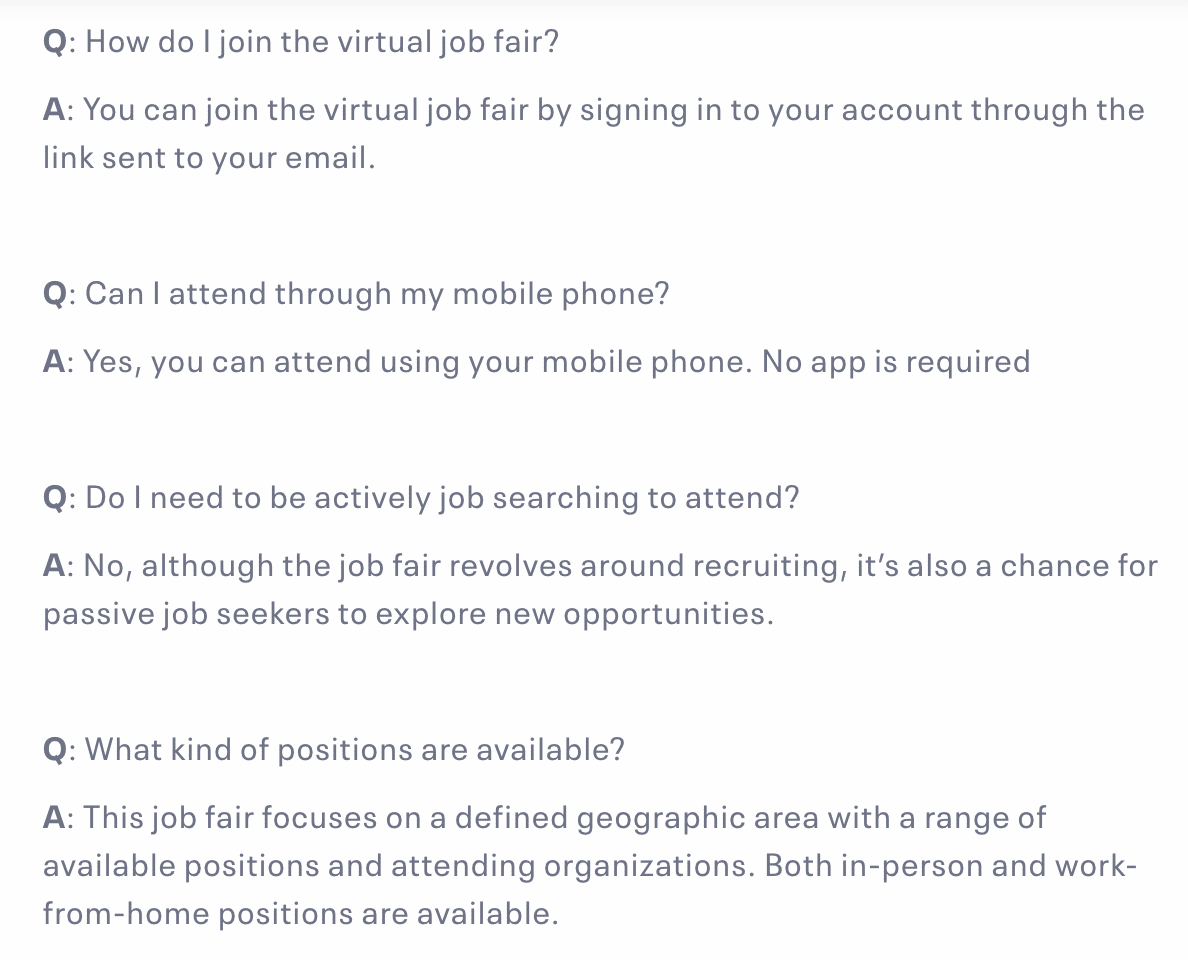
Source: eventbrite
In sum, by sharing pre-event content in the form of videos, FAQ pages, and written descriptions, you ensure that your target audience is well informed about the value they will receive from attending your virtual event.
3. Use Event Speakers to Your Advantage
Wild Apricot found that 70% of organizations with “much more” attendance at their virtual events than they would have had at a live one featured a guest speaker.
It’s therefore important to promote your speakers to your prospective attendees as it can increase registrations, as RampUp, the martech conference has done below in an email to prospective attendees:
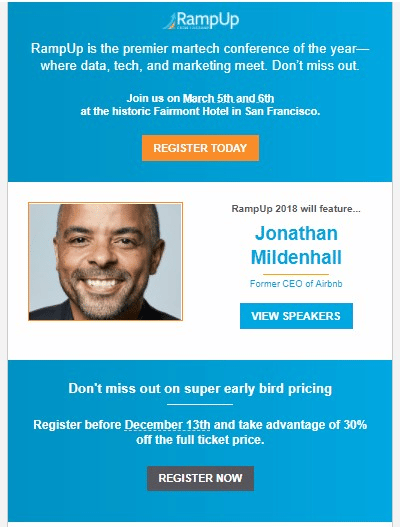
Source: eventsforce.com
Of course, the promotions will only be impactful insofar as the speakers are exciting people whom your target audience wants to hear from.
The best speakers will be thought leaders or other well-known people in your niche who can talk authoritatively about subjects your prospective attendees want to learn more about.
This ensures that they produce top-quality content.
They should also be compelling and engaging speakers with an audience of their own whom they can potentially attract to your event even if they’ve never heard of your brand.
For example, if a virtual event on acting landed Mathew McConaughey as a speaker they’d likely get a lot of his fans coming to the event if only just to hear him speak.
This is a great way to get new attendees in the door.
Once you’ve found speakers for your virtual event, it’s important to promote them in multiple ways across various digital mediums, thereby ensuring a lot of potential registrants get the message.
Here are some of the best places to market your virtual event’s speakers:
| Your event page | Underneath a photo of your top speaker and the title of their speech, describe what the audience will learn (the benefit of attending) and plug some of the speaker’s credentials for those unfamiliar with their work. |
| Your social media accounts | Either through posts or targeted social ads, inform your followers or target audience members about who will be speaking at your event and why they’ll be so fun to watch. |
| The speakers’ social media accounts | Ask your speakers to spread the word about the event to their followers on social media. This helps both you and the speaker, as more good publicity means more fans for each of you. |
Because people tend to be superfans of individuals rather than brands, focusing a lot of your marketing on your event’s most notable speakers can be a great way to get people excited about your virtual event.
4. Rely on Testimonials
According to Vendasta, 88% of customers say reviews influence their online purchasing decisions.
And according to the Demand Gen Report, 97% of customers in the B2B space regard testimonials and peer recommendations as the most trustworthy kind of content.
It’s therefore a smart idea to include testimonials of attendees from your previous virtual events in your marketing materials to increase registration numbers for your upcoming event.
For instance, you should create a testimonials section on your event registration page where you put positive quotes about the event, accompanied by headshots of the attendees who said them.
The picture humanizes the testimonial and makes it more believable to prospective attendees.
For example, here’s a testimonials section for the Apartmentalize conference:
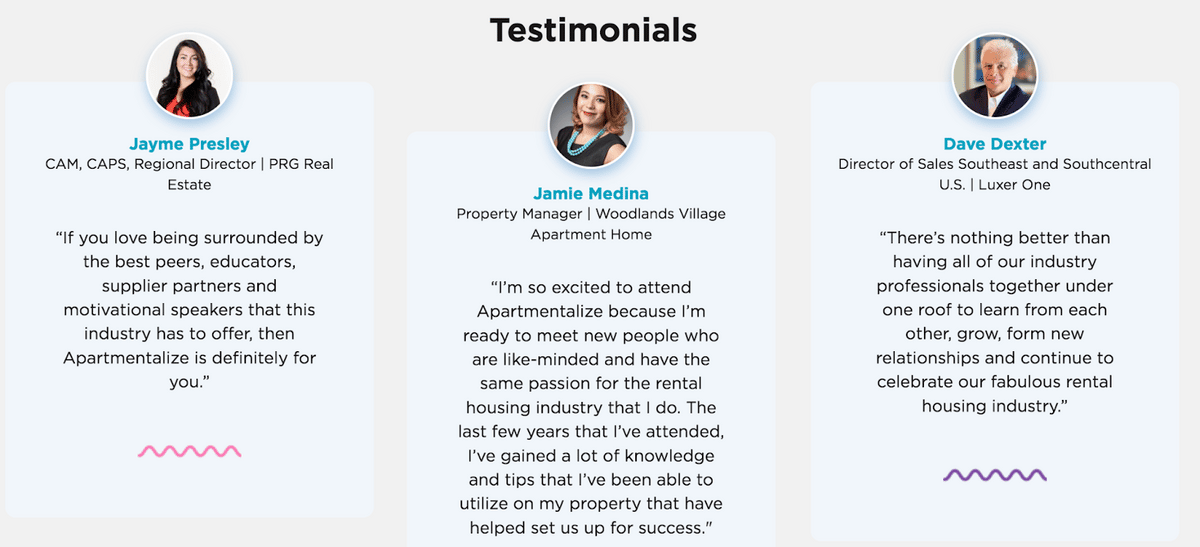
Source: National Apartment Association
And here are some testimonials from last year’s Social Media Strategies Summit virtual conference:
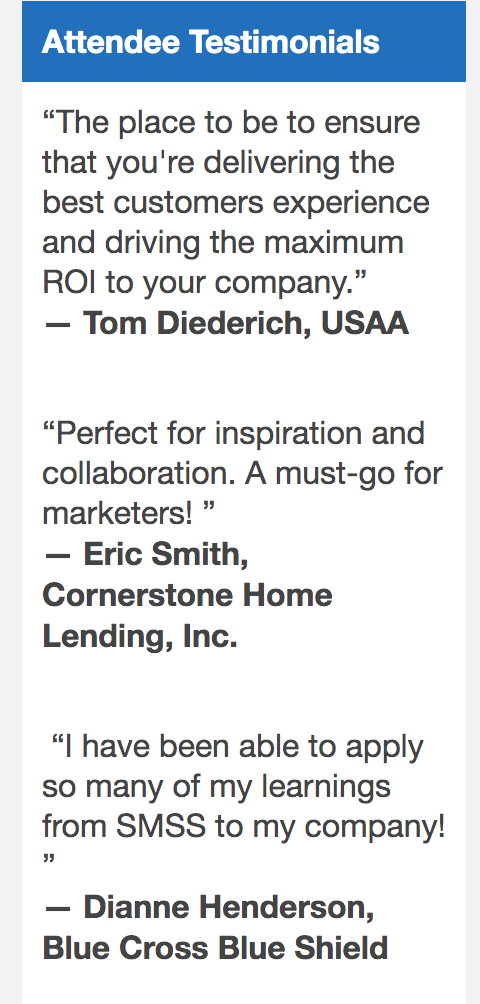
Source: reg.unityeventsolutions.com
In order to always have testimonials at your disposal, it’s important to integrate feedback collection into your post-event process.
After any event, reach out to happy attendees and ask them if they’d provide a testimonial. Or include a form in your follow-up email that prompts attendees to write a review.
If you speak with the happy attendees in-person, don’t be afraid to hold their hand a bit if you know there are some key points you want to emphasize to future attendees.
You can do this by framing the question in a strategic way.
If you wanted them to rave about the speakers, you could ask “Can you tell me what you loved most about the speeches?” instead of “Can you give a testimonial for the event?”
This specific-question approach comes in handy especially when you have done your market research and know there are certain elements your prospective attendees look for.
A well-positioned testimonial can therefore act as a guarantee to your prospective buyers that their needs and desires will be satisfied at your virtual event.
5. Allow Post-event Access
You can increase registrations to your virtual event simply by informing your prospective attendees that they’ll be able to access the virtual event’s content after it has ended.
The type of customer you will secure using this method is someone who is uncertain if they will be available during the event’s live hours.
Perhaps they have an unpredictable job or a couple of kids who could end up catching the flu in their pre-school playgroup.
Whatever the reason, for all they know, circumstances might force them to miss the event. No one wants to waste their money.
Letting them know that they’ll be able to access a recording of the virtual event and other event materials assures them their investment will be safe.
Even if your event is free, as are many webinars, this method will still increase attendance because it’s quite common for a prospective attendee, out of politeness and common sense, to decide against attending because they have a scheduling conflict or time zone difference.
If they see that they don’t have to attend the live event to get the value, then they’ll just register anyway as there’s no cost to them to do so.
Moreover, when you highlight this accessibility in your event promotion materials, all of your attendees will find it to be a value-add, because it means they will be able to get long-term value from it.
That’s because if an attendee thinks that a specific interview or speech is filled with interesting information they want to remember and put into practice, then they can rewatch it as many times as they please.
As a final note, make sure it’s easy for your attendees to find and access this material. One way to do that is to include it on your event website or registration page.
You could also send it out in an email to your attendees after the event.
Conclusion
As a virtual event organizer, the best approach to increasing registrations is to educate your prospective attendees.
Teach them about the logistics — how to attend virtually, when it takes place. But, most importantly, teach them about the value they’ll receive if they come.
Use attendee testimonials, speaker promotional videos, and other content to give them a sense of what they can expect and build excitement.
And spread the word across social media, email, and your event website.
For more on this topic, check out our article on how to improve your attendees’ experience and conversions.


















